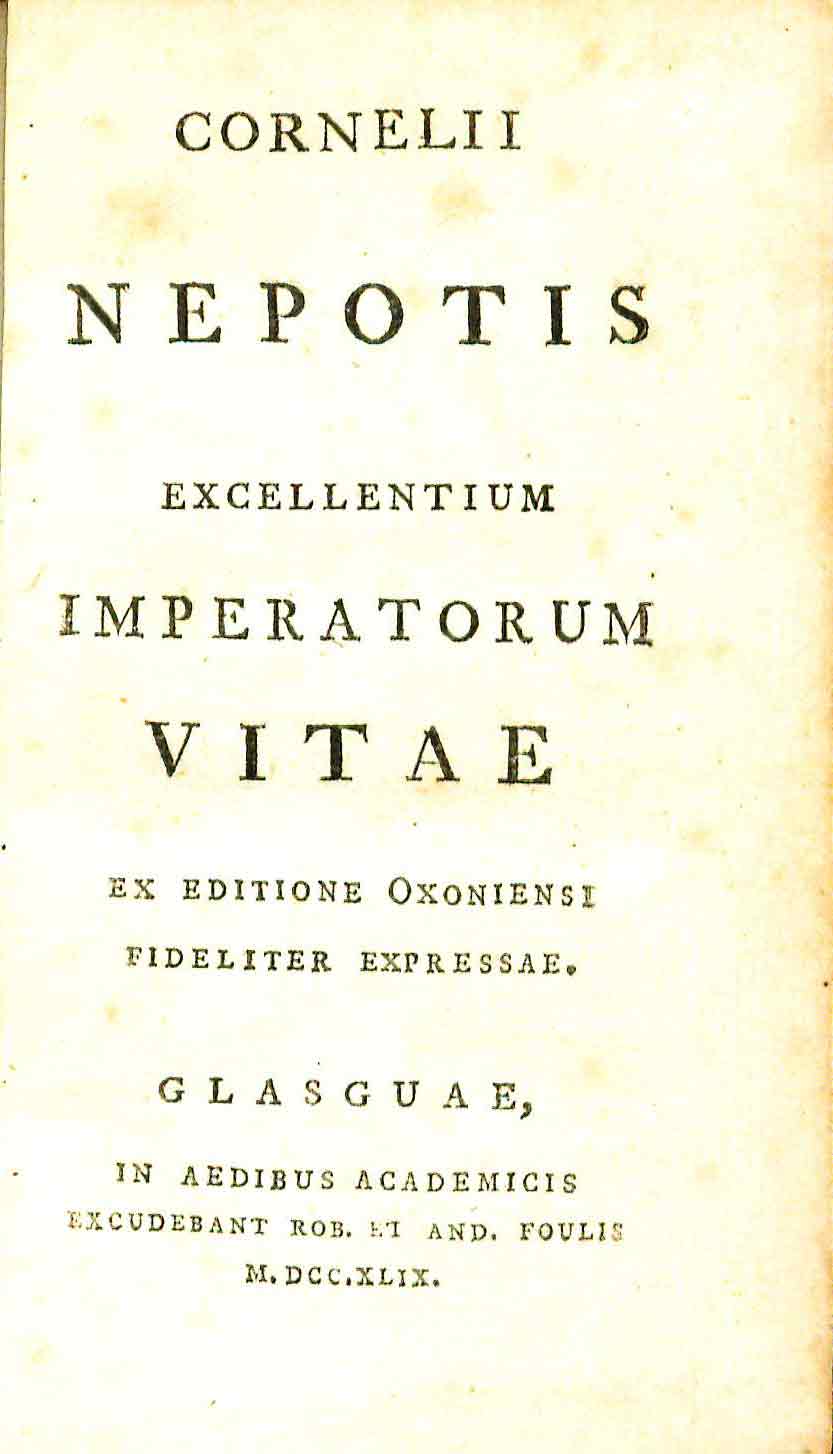Cornelii Nepotis Excellentium Imperatorum Vitae et Editione Oxoniensi Fideliter Expressae
by Cornelius Nepos
| Nepos's Lives of the Excellent Commanders | |
|
Title page from Cornelii Nepotis Excellentium Imperatorum Vitae, George Wythe Collection, Wolf Law Library, College of William & Mary. | |
| Author | Cornelius Nepos |
| Published | Galsguae: In Aedibus Academicis excudebant Rob. et And. Foulis |
| Date | 1749 |
| Language | Latin |
| Pages | xix, [5], 215 |
| Desc. | 12mo (13 cm.) |
| Location | Shelf J-4 |
Cornelius Nepos (c. 110 – 24 BCE) is the earliest extant Latin biographer. He was born in Cisalpine Gaul, on the Roman side of the Alps. By 65 BCE, he had moved to Rome and established himself in the literary circles of the time. His work On Famous Men grouped and chronicled the lives of about 400 men, both Roman and non-Roman, who he recognized as significant and important men. The only surviving remains of On Famous Men are "On Eminent Foreign Generals" and, from his section on Roman Historians, writings on the lives of Porcius Cato and Atticus.[1]
In the latter half of the twentieth century, Nepos was largely discounted as a sub-par researcher and writer due to his basic linguistic structures and error-ridden historical accounts.[2] According to one historian, "the accidents of survival and Nepos' [sic] primacy as the first extant Latin biographer are what make him worthy of study. The biographer's methods, themes, philosophies and political views are secondary to his position on the generic timeline and are not inherently interesting in themselves."[3] In more recent years, however, ancient historians and biographers have been looked upon in a kinder light with an emphasis on the moral tone and purpose of the author:
A biography's historicity, moreover, is often subordinated to its moral agenda. Thus, a biographer might deliberately employ a flexible chronology or prefer anecdotal evidence to harder, grander "facts" and deeds in order to underscore some of his subject's traits, such as loyalty, generosity, restraint—or the lack thereof.[4]
Evidence for Inclusion in Wythe's Library
One of Wythe's students, Littleton Waller Tazewell, mentions reading a copy of "the lives of Cornelius Nepos" in his Account and History of the Tazewell Family (1823) — specifically the life of Eumenes.
Listed in the Jefferson Inventory of Wythe's Library as "Cornelius Nepos. 12mo. Foul." and given by Thomas Jefferson to his grandson Thomas Jefferson Randolph. The precise edition owned by Wythe is unknown. George Wythe's Library[5] on LibraryThing indicates this, adding "Duodecimo editions were published by Foulis in 1742 and 1749." The Brown Bibliography[6] lists the 1742 edition based on the copy Jefferson sold to the Library of Congress.[7] The Wolf Law Library found a copy of the 1749 Foulis edition and purchased it.
Description of the Wolf Law Library's copy
Bound in full brown calf with gilt border to front and rear boards. Spine has four raised bands with gilt decoration and a red morocco label with gilt lettering. Purchased from Schooner Books, Ltd.
Images of the library's copy of this book are available on Flickr. View the record for this book in William & Mary's online catalog.
See also
- Account and History of the Tazewell Family
- Cornelii Nepotis Excellentium Imperatorum: cum Versione Anglica, in qua Verbum de Verbo, Quantum Fieri Potuit, Redditur
- George Wythe Room
- Jefferson Inventory
- Wythe's Library
References
- ↑ John Roberts, ed. "Nēpos, Cornēlius" in Oxford Dictionary of the Classical World (Oxford: Oxford University Press, 2007).
- ↑ Molly M. Pryzwansky, "Cornelius Nepos: Key Issues and Critical Approaches," The Classical Journal 105, no 2 (Dec. 2009): 97.
- ↑ Ibid., 98.
- ↑ Ibid., 100.
- ↑ LibraryThing, s.v. "Member: George Wythe," accessed on November 13, 2013.
- ↑ Bennie Brown, "The Library of George Wythe of Williamsburg and Richmond," (unpublished manuscript, May, 2012) Microsoft Word file. Earlier edition available at: https://digitalarchive.wm.edu/handle/10288/13433.
- ↑ E. Millicent Sowerby, Catalogue of the Library of Thomas Jefferson, (Washington, D.C.: The Library of Congress, 1952-1959), 1:33-34 [no.71].
